 Lebanese Republic
Lebanese Republic The Ministry and Minister
Mission of the Ministry
The Ministry of Economy and Trade is responsible for the administration of Lebanon economic affairs. Hence, the Ministry is dedicated to elaborate, coordinate and implement all the works in the field of trade, economy and supply.
Its mission consists of the following:
| ‹ | Cooperate with other concerned ministries to develop the economic facilities and the national wealth of the country. |
| ‹ | Take the necessary measures to enhance the trade, handle supply issues and protect the consumer by adopting a policy that maintains the economic balance through the elaboration, coordination and implementation process. |
| ‹ | Track the economic developments and take the necessary procedures to benefit from under the trade, supply and consumption conditions of the country. |
| ‹ | Ensure the country’s main consumption needs subject to the legal provisions. |
| ‹ | Prevent monopolies and take appropriate measures for wider trade competition to ensure the public economic interest, in particular the consumer protection. |
| ‹ | Set up studies, especially those related to foreign trade and balance trade as well as to publish the relevant statistics. |
| ‹ | Prepare international draft agreements together with the Ministry of Foreign Affairs and Emigrants and work to implement them. |
| ‹ | Grant licenses related to the importation and exportation of goods subject to the that pre-authorization system upon the Minister of Economy and Trade instructions. |
| ‹ | Participate in fairs, exhibitions and trade centers organized within the country and abroad; to plan, manage and supervise the Lebanese pavilions after consulting the opinion of the competent departments. |
| ‹ | Submit proposals in terms of modifying the customs conditions, when necessary. |
| ‹ | Follow-up on issues of the commercial, industrial, technical, artistic and literary property protection as well as all related agreements. |
| ‹ | Supervise and control the chambers of commerce and industry in addition to the traders associations pursuant to the law. |
| ‹ | Handle the issue of the wheat and its derivatives as well as major products for the sugar industry. |
| ‹ | Follow up on the supply conditions; ensure the local consumer need from the basic food items; organize their sale when necessary and fix prices under the legal profits. |
| ‹ | Give due care to the technical storage of the wheat and its derivatives and the sugar in addition to provide the necessary equipments and supplies. |
| ‹ | Handle the issues of weights, measures and jewelries; suppress fraud pursuant to the laws and regulations in addition to take the necessary decisions that control all different commercial advertisements and set the maximum prices or profits percentage. |
| ‹ | Prevent monopolies, control prices and abide by the relevant legal texts. |
Ministry Organization Chart:
Define what is the ministry organization chart, what is it used to, what does it include, how it could help the user get all the information he needs about the ministry, its departments, positions and how can you get in contact with them. All these information and more can be found in this following CHART (Click here)
Ministry Working Hours:
Monday to Thursday: from 9.00 a.m. to 3.30 p.m.
Friday: from 8.00 a.m. to 3.00 p.m.
Current Minister
Amer Bisat (2025)
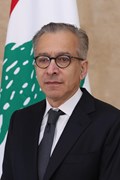
Amer Bisat, PhD., is Minister of Economy and Trade for the Republic of Lebanon.
Dr. Bisat began his career as a senior economist at the International Monetary Fund where he helped negotiate high profile programs with Russia, Ukraine, and Egypt. In 1998, he moved to a career in international financial markets taking on senior portfolio management positions at Morgan Stanely and UBS. In 2013, he joined BlackRock, the world's largest asset manager, as the Global Head of Emerging Markets Fixed Income and a member of the Fixed Income Executive Committee.
Dr. Bisat taught graduate level economics courses at Columbia University. He co-authored a book on globalization, and multiple academic and policy papers on growth and financial sector development. He was the chairman of the Arab Banking Association of North America and is a trustee of a number of cultural and art institutions. He is a member of the Council on Foreign Relations.
Dr. Bisat earned a BA from the American University of Beirut and a PhD. in economics and finance from Columbia University.
Previous Ministers
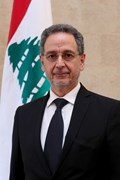
Raoul Nehme
Minister of Economy and Trade since January 21st, 2020
Born on the 20th of January 1956
Married to Mrs. Lina Murr with 2 children
Mr. Nehme has a long-standing experience in the banking and financial domains, in addition to an extensive experience in various business fields.
He occupied a number of positions, among others, Chairman of the Executive Committee of AstroBank Ltd (Cyprus), Chairman of Turkland Bank, Executive General Manager of BankMed, General Manager of BLC Bank and President of Nipson Printing Systems in the US. In addition, he was a member of the Board of the above-mentioned companies in addition to other banks and businesses.
Mr. Nehme has been as well the President and one of the founders of “Jouzour Loubnan Association”, an NGO that promotes sustainable reforestation and participates in the restoration of Lebanese woodland with over 450.000 trees planted across various regions in Lebanon.
Mr. Nehme holds a degree in Engineering from Ecole Polytechnique de Paris (1980) with a major in Economics in addition to an Engineering degree from Ecole des Mines de Paris with a major in Scientific Management (1982).
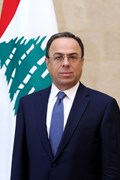
Mansour Bteish
Born : 1st September 1954, Faraya - Lebanon
Married to : Nada Kassis, with 4 children
Languages : Fluent Arabic, French and English
Education
Saint Joseph University, Beirut - Lebanon
- 1976 - 1980 Bachelor degree in Business Administration
- 1980 - 1982 Masters Degree in Money and Banking
- April 1983 Thesis "The Bank Credit in Lebanon"
- Saint Joseph College, Antoura – Lebanon
- June 1973 Lebanese Baccalaureat II (Science Experimental)
Starting 31 January 2019, Lebanese Minister of Economy and Trade
Career
At FRANSABANK SAL Since the 1st of July 1974
- General Manager Since January 2005
- Vice Chairman of FSB Associated Bank in Sudan - UNITED CAPITAL BANK
- Member of the Board of Directors of the following entities in FRANSABANK Group:
In Lebanon :
- BLC BANK SAL
- FRANSA INVEST BANK SAL (FIB)
- Lebanese Leasing Company SAL (LLC)
Abroad :
- FRANSABANK (France) SA
- FRANSABANK EL DJAZAÏR SPA
- USB Bank PLC - Cyprus
- Preparation, organization & coordination of several internal annual seminars held for FRANSABANK Senior & Middle Management, to raise and communicate strategic issues and yearly objectives.
- Attended since September 1984 (34 years), the IMF / World Bank annual meetings.
- Speaker and attending at several seminars & conferences in Lebanon & abroad.
- As of 1999, Member of the Committee for Economic Studies and Banking at the Association of Banks in Lebanon (ABL) which I had chaired for 19 months from February 2008 to August 2009, and again Chairperson since April 2013 to date.
- As of October 2017, Member of the Economic and Social Council (CES) and President of Economic Affaires Commission.
- Published several books, studies and articles related to socio-economic topics, and participated in the elaboration of macro-economic papers.
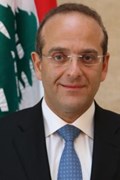
Raed Khoury
Born in Choueifat in 1975. He is a Chartered Financial Analyst (CFA), he holds a Bachelor degree in Economics and a Masters degree in Money and Banking from the American University of Beirut (AUB).
He held the post of Minister of Economy & Trade in the government of Lebanon formed by Prime Minister Saad Hariri since December 18th, 2016. During his term he established the appropriate frameworks to set up a comprehensive economic plan for Lebanon that clearly defines Lebanon’s economic identity for the upcoming years, enhances the productive sectors in Lebanon, insures sustainable development in all Lebanese regions , and consequently diversifies and increases the size of the economy. At the beginning of 2018, the Government launched the work on the economic plan in order to achieve the set goals and objectives.
Minister Khoury enjoys an extensive and diversified banking and financial experience with a focus on Wealth Management, Investment Banking Services and Brokerage. Minister Khoury is one of the Founders of Cedrus Invest Bank and Cedrus Bank sal.
As a former director at Barclays Wealth, he was in charge of a team of Bankers covering the MENA and Gulf regions. He spent more than 7 years at Bank Audi Group where he held managerial positions in banking services covering Lebanon, Switzerland and Kingdom of Saudi Arabia.
He is married to Carole Abi Habib and has two children: Ray and Karen.
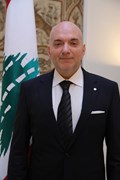
Dr. Alain Hakim is a Lebanese politician and banker.
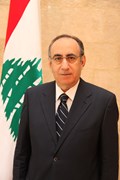
Nicolas Nahas Personal Profile
- Vice president of the Lebanese Industrialists Association
- Member, Deans International Council, Harris School of Public Policy Studies, University of Chicago
- Chairman of Business Development Company (EDAFI)
- Chairman of Levant Beverage and Dairy holding (LBDH) with its affiliate
- Chairman of Saboun s.a.l
- Member of the Board of Directors of Ciment de Sibline s.a.l
- Member of the Board of the Middle East Prospect Forum (MEP)
- Member of the Board of the of ‘International Tube & Conduit Company (ITCC ) (Jeddah - Saudi Arabia)
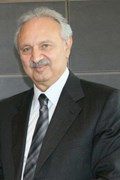
Member of the Lebanese Parliament Minister of Economy and Trade
• Education
Minister Safadi was born in Tripoli, Lebanon on March 28, 1944. He graduated from Brummana High School in 1962. He later attended the American University of Beirut, where he obtained a Bachelor of Business Administration degree in 1968.
• Business Career
Shortly thereafter, he launched his business career and went on to establish the SAFADI GROUP HOLDING SAL, which maintains investments in diverse fields covering Real Estate Development, Hotels, Information Technology, Business Aviation and Airports.
• Public Service
During his 10 years as Member of Parliament, Mr. Safadi was influential on a number of key economic and fiscal issues. He served as Member of the Finance and Budget Committee; and the National Economy, Trade, Industry and Planning Committee. Mr. Safadi also played an active role as Head of the Lebanese–German Parliamentary Friendship Committee; a Member of the Lebanese–Kuwaiti Parliamentary Friendship Committee, and as President of the Lebanese Section of the Arab Common Market.
Mr. Safadi was appointed as Minister of Public Works and Transport between July 2005 and July 2008, as well as Acting Minister of Water and Energy between January 2007 and July 2008. He first assumed the post of Minister of Economy and Trade on July 22, 2008 and was re-appointed to serve a second term in 2009. In this current post, Minister Safadi also takes on duties as Lebanon’s Alternate Governor on the World Bank’s Board of Governors, and as Governor on the Multilateral Investment Guarantee Agency’s (MIGA) Board of Governors.
• Civil Society
Mr. Safadi has also dedicated his efforts to civil society. He is founder and Honorary President of the SAFADI FOUNDATION, a not-for-profit non-governmental organization that deals with social, medical, environmental and educational issues. The Foundation focuses on the development and unique role of the individual.
Mr. Safadi is a Trustee of the Lebanese American University, the Al Jinan University, the American Community School in Beirut, and the Entrepreneurial Training Foundation. He is also a member of the Dean’s Council of the John F. Kennedy School of Government’s at Harvard University.
• Merits of Honor
Minister Safadi has been awarded the Knights Cross of the National Legion of Honor of the Republic of France, as well as the Cross of the Order of Merit from the Federal Republic of Germany.
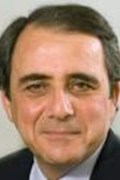
Sami Haddad (Arabic: سامي حداد) (born August 26, 1950) was the Lebanese minister of economy and trade.
Born in Lebanon, Haddad graduated from the American University of Beirut (AUB) in 1971 with a degree in economics. He began his banking career with a position at Societe Generale in Beirut.
He earned a master degree at economics in 1977 from AUB and studied for a PhD in development economics from 1977 to 1979 at the University of Wisconsin–Madison, fulfilling all requirements for the degree except the dissertation, thus not getting the PhD.
From 1979 to 1981 he worked as the personal assistant to the governor of the Banque du Liban, Lebanons central bank.
In 1981 he began a career at the World Bank Group which continued until his appointment as minister of economy and trade in July 2005.
Haddad is married and has two children.

Dr. Damianos Kattar, born in Jezzine in 1960, has a doctorate in Strategic Planning. He had been the Finance, Economy and Trade Minister between April and July 2005. He was also the Chief of the first aid teams in the Lebanese Red Cross.
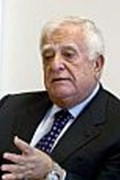
|
|
|
|
|
|
|
Adnan Kassar, a Lebanese businessman, has a Bachelor degree in Law from Saint Joseph University in Beirut. He is married to Raida and they have one daughter.
In 1972 Mr. Kassar was elected President of the Beirut Chamber of Commerce and Industry, a position he held for over thirty years.
Throughout the war years that Lebanon endured between 1976 and 1991, Adnan Kassar remained in Lebanon at the head of the private sector.He geared his efforts towards keeping Lebanon present in world meetings, symposiums, conferences, international fairs and exhibitions.
Adnan Kassars strong belief in maintaining the unity of the Lebanese economy urged him to establish and develop a productive coordination and cooperation between all Lebanese Chambers of Commerce. This led to the establishment of the Federation of Chambers of Commerce, Industry and Agriculture in Lebanon.He has chaired this Federation since its foundation and succeeded in placing it at the forefront of the Lebanese economy.
What distinguishes Adnan Kassar is the respect and credibility he enjoys in the Lebanese, Arab and international business communities. This paved the way for Adnan Kassar to be elected Chairman of the General Union of Arab Chambers of Commerce, Industry and Agriculture for more than one term in the past and for a current term of two years. This came as a distinguished recognition for his continued contribution to the promotion of inter-Arab trade and investment and the establishment and development of the private sector in the Arab world. His diligent efforts have contributed to the creation of the Greater Arab Free Trade Area which will serve as a prelude for the establishment of the Arab Common Market.
Adnan Kassars international relations, his leading role and long experience at the International Chamber of Commerce (ICC) based in Paris and present in over 140 countries, coupled with his contribution to the wellbeing of world business to lead his election as Chairman of the ICC a position which he held for a two-year period (1999-2000).
Right from the beginning of his term, Adnan Kassar proved to be a skilled and able leader of this World Business Organization. He successfully expanded its international activities and increased its role as the only true representative body of international business. His efforts were also geared towards promoting the role of ICC in the world economy and increasing the private sectors contribution to global growth and social development.
In his private capacities, Adnan Kassar is the founder and a partner of Adnan & Adel Kassar enterprises (A.A.KASSAR), a Lebanese based group of enterprises with activities in different economic sectors, and which is a leading investor in various sectors in Lebanon and overseas, managed throughA.A.Kassars various overseas subsidiaries.
Mr. Adnan Kassar and his brother Adel acquired in 1980, Fransabank, the oldest bank in Lebanon.Under the chairmanship of Mr. Adnan Kassar, Fransabank Group developed into one of the largest and leading banks in Lebanon, and the most prominent one with regard to its international affiliations. Today, Fransabank Group has over 60 branches in Lebanon, and a presence in France, Algeria, Sudan, Syria, Libya and Belarus.
In addition, Fransabank has several strategic alliances with leading international banks, financial institutions and organizations. Amongst these are Credit Agricole of France, DEG/Deutsche Investment and Development Group of Germany and the Public Institution for Social Security of Kuwait. Fransabank also has strategic business cooperation with the International Finance Corporation (IFC), the European Community for Investment Partners (ECIP), the Islamic Development Bank and the Arab Trade Finance Program. Mr. Adnan Kassar, given his credible, strong and historic leadership in the Lebanese private sector, was appointed Minister of Economy and Trade of the Republic of Lebanon in October of 2004. The events that followed the cruel assassination of Lebanons former Prime Minister, His Excellency Mr. Rafic Hariri brought political instability, which has lead to the resignation of the government of Lebanon in March of 2005.
Mr. Adnan Kassar, given his credible, strong and historic leadership in the Lebanese private sector, was appointed Minister of Economy and Trade of the Republic of Lebanon in October of 2004. The events that followed the cruel assassination of Lebanons former Prime Minister, His Excellency Mr. Rafic Hariri brought political instability, which has lead to the resignation of the government of Lebanon in March of 2005.
On 9 November 2009
Adnan Kassar was appointed Minister of State in the Unity Government formed by Prime Minister Saad Harriri. Mr. Kassar was named by the President of the Republic General Michel Suleiman.
Privately, Adnan Kassar is an avid supporter of culture and arts in Lebanon and internationally.He holds the prestigious position as member on the Distinguished Board of International Advisors of the White Nights Foundation of America, which supports the Marrinsky theater.This Foundations commitment is to strengthen and expand the cultural, educational and business and to be a positive, apolitical force for peace.
In recognition to his distinguished and exceptional economic achievements on the Lebanese and international fronts, Adnan Kassar has been awarded several international decorations and official orders of merit, which include:
The Lebanese National Cedar Order of Merit
|
|
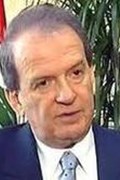
Marwan Hamadeh (born September 11, 1939) is the former Lebanese Minister of Telecommunications. He has also held the positions of Minister of the Economy and Trade, Minister of Tourism, and Minister of Health.
Hamadeh was injured in a car bomb explosion on October 1, 2004 that killed his driver and injured his bodyguard [1]. The blast is considered to have been the beginning of series of assassinations of Lebanese politicians and journalists. MP Marwan Hamadeh had resigned his ministerial post just weeks prior to the explosion in protest of the Syrian-backed three year extension of President Émile Lahoud's term. Hamadeh, formerly one of Syria's staunchest allies in Lebanon, became a critic of the Syrian occupation of Lebanon after Resolution 1559 was passed. Mr. Hamadeh's sister Nadia Tueni, a notable author and French poet, was married to Ghassan Tueni, UN ambassador and senior editor of the Lebanese daily, An Nahar. Their son, and MP Hamadeh's nephew, MP Gebran Tueni, was assassinated in a car bombing in Beirut in December 2005.
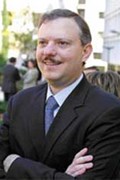
Bassel Fleihan (Arabic: باسل فليحان, September 10, 1963 - April 18, 2005) was a Lebanese legislator and Minister of Economy and Commerce. He died from injuries sustained when a massive bomb exploded on the Beirut seafront as he passed by in former Lebanese Prime Minister Rafik al-Hariri's motorcade on February 14, 2005. 20 other people, including Hariri, were killed by the blast. Despite being seated beside Hariri when the explosion occurred, Fleihan lived through the attack; however, severe burns covered over 95% of his body. Fleihan was airlifted to Percy Military Hospital in Clamart (suburb of Paris), where he survived for 64 days before finally succumbing to his injuries.
Education
Fleihan attended International College. He received a BA in Economics (cum laude) from the American University of Beirut (AUB) in 1984, an MA in International and Development Economics from Yale University in 1985, and a PhD in Economics from Columbia University in 1990.
Career
Professional career
From 1988 to 1993, Fleihan worked at the International Monetary Fund in Washington DC. In 1993, he left his job and promising future in the United States and returned to Lebanon, where he had been asked to assist in the post-war rehabilitation of the Ministry of Finance. While working as an adviser to the Ministry, from 1993 to 1999, Fleihan also taught economics at his old alma mater, AUB.
Political career
Fleihan was first elected to the Parliament of Lebanon in 2000, winning the Protestant seat in Beirut's first electoral district. He ran as a member of Hariri's "Dignity of Beirut" electoral list; in October of the same year, he was appointed Minister of Economy and Trade, a position he held until the government resigned in 2003.
Fleihan played a major role in the development of Lebanon's economic reform program, which was presented by Hariri to international donors at a Paris conference in November 2002. Donors pledged $4.3 billion in soft loans; unfortunately, the plan was never fully implemented, but Lebanon did ultimately receive $2.39 billion from the donors.
February 14, 2005
The day before the fateful explosion, Fleihan was thousands of miles away from Beirut in Geneva Switzerland. Although his wife tried to convince him to extend his stay in Europe, Fleihan insisted on returning to Lebanon for an extraordinary Parliamentary session scheduled for February 14.
After the session, Fleihan joined Hariri in his motorcade to head back to the latter's mansion in West Beirut. About half-way through their journey, a one-ton truck bomb exploded as they passed through the city's upscale seafront hotel district. At least a dozen people-- including Hariri and several of his bodyguards-- were killed instantly; the final death toll rose to 21. A United Nations investigation of the incident by Detlev Mehlis, released in October 2005, pointed the finger at Syrian and Lebanese officials.
The bombing caused widespread outrage in Lebanon, sparking a protest movement that has now been dubbed the "Cedar Revolution." During the 64 days Fleihan survived, "Cedar Revolutionaries" and other supporters held numerous vigils in his honor.
Personal life
A quiet, academic man, Fleihan was a devout Protestant and a member of the National Evangelical Church of Beirut. Fleihan is survived by his wife, Yasma Fleihan, and their two young children, Rena and Rayan.

First Ministry: 25 September 1943 2 July 1944
Prime Minister: Riad Al Solh
Minister of Economy: Adel Ousseiran
Second Ministry: 3 July 1944 9 January 1945
Prime Minister: Riad Al Solh
Minister of Supplies and Reserves: Riad Al Solh
Third Ministry: 9 January 1945 22 August 1945
Prime Minister: Abed AlHamid Karameh
Minister of Supplies and Reserves: Jamil Talhouk
Fourth Ministry: 22 August 1945 22 May 1946
Prime Minister: Sami Al Solh
Minister of Supplies and Reserves: Sami Al Solh
Fifth Ministry: 22 May 1946 14 December 1946
Prime Minister: Saadi Al Munla
Minister of Economy: Saadi Al Munla
Sixth Ministry: 14 December 1946 7 June 1947
Prime Minister: Riad al Solh
Minister of Economy: Kamal Jumblat
Seventh Ministry: 7 June 1947 26 July 1948
Prime Minister: Riad Al Solh
Minister of Economy: Sleiman Nawfal
Eighth Ministry: 26 July 1948 1 October 1949
Prime Minister: Riad Al Solh
Minister of Economy: Phillip Takla
Ninth Ministry: 1 October 1949 14 February 1951
Prime Minister: Riad Al Solh
Minister of Economy: Phillip Takla
Tenth Ministry: 14 February 1951 7 June 1951
Prime Minister: Hussein Al Oueini
Minister of Economy: Boulos Fayyad
Eleventh Ministry: 7 June 1951 11 February 1952
Prime Minister: Abdullah Al Yafi
Minister of Economy: Phillip Takla
Twelfth Ministry: 11 February 1952 9 September 1952
Prime Minister: Sami Al Solh
Minister of Economy: Sleiman Al Ali
Thirteenth Ministry: 9 September 1952 14 September 1952
Prime Minister: Nazem Akkari
Minister of Economy: Basil Trad
Did not present itself in front of Parliament, and did not submit a Ministerial Statement
14 September 1952 18 September 1952
Prime Minister: Saeb Salam
Minister of Economy: Basil Trad
Fourteenth Ministry: 18 September 1952 30 September 1952
Prime Minister: Fouad Shehab
Minister of Economy: Basil Trad
Did not present itself in front of Parliament and did not submit a Ministerial Statement
Fifteenth Ministry: 30 September 1952 30 April 1953
Prime Minister: Khaled Shehab
Minister of economy: George Hakim
Sixteenth Ministry: 30 April 1953 16 August 1953
Prime Minister: Saeb Salam
Minister of Economy: George Hakim
Seventeenth Ministry: 16 August 1953 1 March 1954
Prime Minister: Abdullah Al Yafi
Minister of Economy: Rashid Karameh
Eighteenth Ministry: 1 March 1954 16 September 1954
Prime Minister: Abdullah Al Yafi
Minister of Economy: Rashid Karameh
Nineteenth Ministry: 16 September 1954 9 July 1955
Prime Minister: Sami Al Solh
Minister of Economy: Rashid Karameh
Twentieth Ministry: 9 July 1955 19 September 1955
Prime Minister:Sami al Solh
Minister of Economy:Rashid Karameh
Twenty First Ministry: 19 September 1955 19 March 1956
Prime Minister:Rashid Karameh
Minister of Economy:Nazih Al Bizri
Twenty Second Ministry: 08 June 1956 8 November 1956
Prime Minister:Abdulla Al Yafi
Minister of Economy:George Hakim
Twenty Third Ministry: 8 June 1956 18 November 1956
Prime Minister:Abdullah Al Yafi
Minister of Economy:George Karam
Twenty Fourth Ministry: 18 November 1956 18 August 1957
Prime Minister:Sami Al Solh
Minister of Economy:Nasri Maalouf
Twenty Fifth Ministry: 18 August 1957 14 March 1958
Prime Minister: Sami Al Solh
Minister of Economy: Kazem Al Khalil
Twenty Sixth Ministry: 14 March 1958 24 September 1958
Prime Minister: Sami Al Solh
Minister of Economy: Kazem Al Khalil
Twenty Seventh Ministry: 24 September 1958 14 October 1958
Prime Minister: Sami Al Solh
Minister of Economy: Charles Helou
Did not present itself in front of Parliament and did not submit a Ministerial Statement
Twenty Eighth Ministry: 14 October 1958 14 May 1960
Prime Minister: Rashid Karameh
Minister of Economy: Rashid Karameh
Resignation of Rashid Karameh from the Ministry of Economy and Phillip Takla was appointed instead
Prime Minister: Ahmad Al Daouk
Minister of Economy: Phillip Takla
Its task was to hold Parliamentary elections and did not submit a Ministerial Statement
Thirtieth Ministry: 1 August 1960 20 May 1961
Prime Minister: Saeb Salam
Minister of Economy: Sleiman Al Ali
Thirty First Ministry: 20 May 1961 31 October 1961
Prime Minister: Saeb Salam
Minister of Economy: Phillip Boulos
Thirty Second Ministry: 31 October 1961 20 February 1964
Prime Minister: Rashid Karameh
Minister of Economy: Rafic Naja
Thirty Third Ministry: 20 February 1965 25 September 1964
Prime Minister: Hussein Al Oueini
Minister of Economy: Fouad Ammoun
Thirty Fourth Ministry: 25 September 1964 18 November 1964
Prime Minister: Hussein Al Oueini
Minister of Economy: Joseph Najjar
Thirty Fifth Ministry: 18 November 1964 25 July 1965
Prime Minister: Hussein Al Oueini
Minister of Economy: Bahij Takieddine
Thirty Sixth Ministry: 25 July 1965 9 April 1966
Prime Minister: Rashid Karameh
Minister of Economy: Rafic Naja
Thirty Seventh Ministry: 9 April 1966 6 December 1966
Prime Minister: Abdullah Al Yafi
Minister of Economy: Sobhi Al Mahmasani
Thirty Eighth Ministry: 6 December 1966 8 February 1968
Prime Minister: Rashid Karameh
Minister of Economy: Said Hamadeh
Thirty Ninth Ministry: 8 February 1968 12 October 1968
Prime Minister: Abdallah Al Yafi
Minister of Economy: Edward Honein
Fortieth Ministry: 12 October 1967 20 October 1968
Prime Minister: Abdallah Al Yafi
Minister of Economy: Nasri Maalouf
Did not present itself in front of Parliament and submitted its resignation on 20/10/1968
Forty First Ministry: 20 October 1968 15 January 1969
Prime Minister: Abdullah Al Yafi
Minister of Economy: Hussein Al Oueini
Forty Second Ministry: 15 January 1969 25 November 1969
Prime Minister: Rashid Karameh
Minister of Economy: Nassim Majdalani
Forty Third Ministry: 25 November 1969 13 October 1970
Prime Minister: Rashid Karameh
Minister of Economy: Sleiman Franjieh
Mr. Nassim Majdalani was appointed Minister of Economy after Sleiman Franjieh was elected president of the Republic
Fourty Fourth Ministry: 13 October 1970 27 May 1972
Prime Minister: Saeb Salam
Minister of Economy: Saeb Jaroudy
Fourty Fifth Ministry: 27 May 1972 25 April 1973
Prime Minister: Saeb Salam
Minister of Economy: Anwar Al Sabbah
Fourty Sixth Ministry: 25 April 1973 8 July 1973
Prime Minister: Amin Hafez
Minister of Economy and Trade: Bahij Tabbara
Did not present itself in front of Parliament and submitted its resignation on 14-6-1973 and the resignation was accepted on 8-7-1973
Fourty Seventh Ministry: 8 July 1973 30 October 1974
Prime Minister: Takieddine Al Solh
Minister of Economy: Nazih Al Bizri
Fourty Eighth Ministry: 31 October 1974 22 May 1975
Prime Minister: Rashid Al Solh
Minister of Economy: Abbas Khalaf
Fourty Ninth Ministry: 22 May 1975 1 July 1975
Prime Minister: Noureddine Al Rifai
Minister of Economy: Fawzi Al Khatib
Did not submit a Ministerial Statement to the Parliament
Fiftieth Ministry: 1 July 1975 9 December 1976
Prime Minister: Rashid Karameh
Minister of Economy: Adel Osseiran
Ministerial Portfolios were redistributed and George Skaff was appointed Minister of Economy
Fifty First Ministry: 9 December 1976 16 July 1979
Prime Minister: Selim Al Hoss
Minister of Economy: Selim Al Hoss
Fifty Second Ministry: 16 July 1979 25 October 1980
Prime Minister: Selim Al Hoss
Minister of Economy: Talal Al Merhebi
Fifty Third Ministry: 25 October 1980 8 October 1982
Prime Minister: Shafic Al Wazzan
Minister of Economy: Khaled Jumblat
Fifty Fourth Ministry: 8 October 1982 29 April 1984
Prime Minister: Shafic Al Wazzan
Minister of Economy: Ibrahim Halawi
Fifty Fifth Ministry: 30 April 1984 22 September 1988
Prime Minister: Rashid Karameh
Minister of Economy: Victor Kassir
Fifty Sixth Ministry: 22 September 1988 25 November 1989
Prime Minister: Michel Aoun
Minister of Economy: Issam Abu Jamra
Fifty Seventh Ministry: 25 November 1989 23 December 1990
Prime Minister: Selim Al Hoss
Minister of Economy: Nazih Al Bizri
Fifty Eighth Ministry: 24 December 1990 15 May 1992
Prime Minister: Omar Karameh
Minister of Economy: Marwan Hamadeh
Fifty Ninth Ministry: 16 May 1992 30 October 1992
Prime Minister: Rashid Al Solh
Minister of Economy: Samir Makdasi
Sixtieth Ministry: 31 October 1992 May 1995
Prime Minister: Rafic Al Hariri
Minister of Economy: Hagop Yarwant Demerjian
Sixty First Ministry: May 1995 October 1996
Prime Minister: Rafic al Hariri
Minister of Economy: Yassine Jaber
Sixty Second Ministry: 7 November 1996 24 December 1998
Prime Minister: Rafic Al Hariri
Minister of Economy: Yassine Jaber
Sixty Third Ministry: December 1998 October 2000
Prime Minister: Selim Al Hoss
Minister of Economy: Nasser Al Saidi
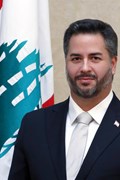
Amin Salam
Lebanese Minister of Economy and Trade
Award-winning Executive with 20+ years of international business development and legal experience, Amin Salam is a seasoned executive and international advisor with experience in economic and social development, management, strategic leadership, advocacy, government relations, communications, public affairs, public policy, and coalitions building, creating and managing an international footprint covering 50+ countries, with focus on post-conflict regions.
He drove expansion into global markets for major fortune 500 companies including technology, defense, aviation, energy, telecommunications, pharmaceutical, manufacturing, and major infrastructure projects.
As Senior Managing Director at Ankura Global Consulting Group, Salam advises on global infrastructure projects, trade, FDI and manages the global operations of the firm with focus on international market growth.
As Vice President of the National US-Arab Chamber of Commerce, Amin served as the primary liaison between the US and the 22 countries of Middle East and North Africa (MENA) in advising high level officials in the public and private sectors on issues of trade, investment, security, and foreign affairs.
Salam’s professional experience includes:
Ø Advanced US economic goals through the US National Export Initiative, through which he cultivated extensive contacts with major industry officials to coordinate US defense and commercial sales with major aviation and infrastructure companies to include Boeing, Lockheed Martin, Schlumberger, and General Electric.
Ø Engaged by foreign sovereign wealth funds from the Gulf Cooperation Council Countries (GCC) as an external economic development expert in assisting and identifying new investment markets around the world, with focus on the Americas.
Ø Advised the Dubai Free Zone Council in developing a new strategic plan to transform the Emirates’ free zones, which are key drivers of 2021 Dubai Economic Development Plan, into international investment destinations. Represented the Council’s policy interests at the international level.
Ø Advised investment agencies in two North African countries in the development of economic and investment strategies with focus on attracting foreign direct investment (FDI) and drafting new investment regulations.
Ø Engaged by foreign central and commercial banks to help them build partnerships with major US companies with cyber security expertise and data center capabilities.
Ø Managed multiple trade development initiatives including trade missions to the Middle East and North Africa in partnership with United States Trade Development Agency (USTDA).
Ø Represented prominent US aviation and defense companies in negotiating and closing over $30 billion of commercial and defense sales to be executed and delivered over a five-year period.












